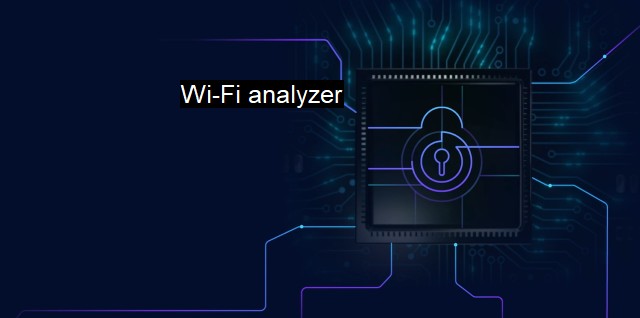What is Wi-Fi analyzer?
The Importance of Wi-Fi Analyzers for Cybersecurity and Antivirus Protection Measures
A Wi-Fi Analyzer is a fundamental tool deployed by cybersecurity professionals and basically anyone needing to tighten network security or optimize Wi-Fi network connectivity and coverage. It goes beyond the simple monitoring rests of displaying the signal strength to offer a suite of analysis functions that aid in mitigating problems related to Wi-Fi performance. Using analytical insights drawn out of the Wi-Fi scanner tool, individuals can identify operating channels with low interference levels, optimize configuration settings, and design the placement of routers for effective Wi-Fi signal distribution.From a cybersecurity perspective, a Wi-Fi analyzer is an intrinsic part of the aggregated knowledge on assets, potential vulnerabilities, communication patterns, traffic spikes, and unapproved access points, necessary to prevent cybersecurity threats before they occur. Networks are under constant surveillance by cyber adversaries, looking for vulnerable spots to penetrate and establish a steadfast foothold. An instrument as a Wi-Fi Analyzer can harness its detection and analysis capabilities to timely unearth such spots and fix them, thwarting adversarial ambitions.
One way Wi-Fi analyzers strengthen cybersecurity is by uncovering rogue access points; these are unauthorized Wi-Fi routers plugged into the secure corporate network without the IT department's knowledge. Since these are often set up without adhering to strict IT security policies, they represent weak links susceptible to being compromised, potentially enabling a cyber-attacker illicit entrance into the secure network hub. The Wi-Fi Analyzer, with regular scanning routines, can identify these rogue access points and alert the cybersecurity team to take immediate action.
A Wi-Fi analyzer can also fend off Wi-Fi Piggybacking, another significant cybersecurity concern. Piggybacking refers to unauthorized users exploiting the Wi-Fi network to access the internet. These hitchhikers could be benign freeloaders or malicious agents with intent to exploit network vulnerabilities for personal benefit. Wi-Fi analyzers can help identify unauthorized devices connected to the network and help to block these devices to maintain network integrity.
Apart from preventing unauthorized access, the Wi-Fi Analyzer also plays a role in detecting potential botnet activity in a network—a collective of infected devices, also known as zombies, controlled remotely by a bot herder. Significant jumps in network traffic or unconventional communication patterns within a Wi-Fi network may be a botnet's indication. With sharp analysis algorithms, Wi-Fi Analyzers can aid cybersecurity personnel in botnet detection thereby, protecting the network from massive, coordinated cyber-attacks launched by botnets.
Apart from reinforcing defense mechanisms, this tool provides intelligence about network usage, signal strength, and channel congestion, helping network administrators fine-tune settings to keep the network environment safe from data theft, intrusion, and malware infection. For a strict security measure, Wi-Fi analyzers can also track Wi-Fi Signal-to-Noise (SNR) ratios, optimizing networks to have more robust security protocols that are hard to crack from the outside.
In the context of antivirus, Wi-Fi Analyzers can aid in implementing better network performance, facilitating smoother antivirus updates and real-time scanning. Regular updates are crucial to keeping the antivirus database current with information needed to counter new malicious software threats. by ensuring a stable and optimized Wi-Fi network, users can leverage cloud antivirus solutions and connect multiple devices without risking performance degradation.
a Wi-Fi analyzer stands as an imperative tool within the cybersecurity echo system. Its network analysis capabilities extend from reinforcing Wi-Fi performance to sophisticated detailed investigations, supporting the early recognition and obliteration of potential network vulnerabilities. In an increasingly interconnected world, ensuring a strong Wi-Fi network devoid of vulnerabilities and intrusion activities, is not merely an optimization task but a bare security necessity—an area where Wi-Fi analyzers mainly reside.

Wi-Fi analyzer FAQs
What is a Wi-Fi Analyzer?
A Wi-Fi Analyzer is a tool that scans the wireless network environment to identify the Wi-Fi networks and their respective signal strength, channel usage, and security protocols.How can a Wi-Fi Analyzer help with cybersecurity?
A Wi-Fi Analyzer can help with cybersecurity by detecting the presence of unauthorized Wi-Fi networks or devices in the vicinity that can potentially be used for malicious purposes. It can also help identify weak spots in the network where security improvements are necessary.Can a Wi-Fi Analyzer detect viruses and malware in a network?
No, a Wi-Fi Analyzer is not designed to specifically detect viruses and malware in a network. However, it can help identify unusual traffic patterns and unusual devices on the network that may indicate a security breach.Is it legal to use a Wi-Fi Analyzer to scan for Wi-Fi networks in public places?
Yes, it is generally legal to use a Wi-Fi Analyzer to scan for Wi-Fi networks in public places. However, it is important to note that connecting to unauthorized Wi-Fi networks without permission is illegal and can lead to cybersecurity risks.| | A | | | B | | | C | | | D | | | E | | | F | | | G | | | H | | | I | | | J | | | K | | | L | | | M | |
| | N | | | O | | | P | | | Q | | | R | | | S | | | T | | | U | | | V | | | W | | | X | | | Y | | | Z | |
| | 1 | | | 2 | | | 3 | | | 4 | | | 7 | | | 8 | | |||||||